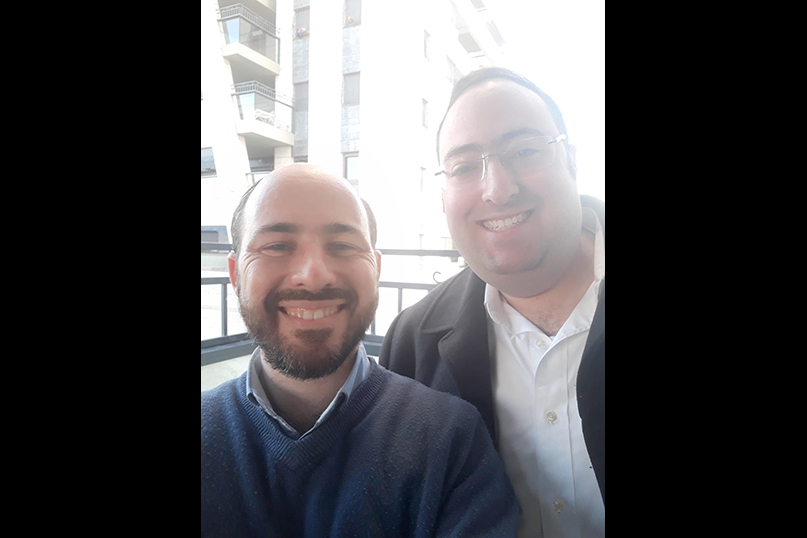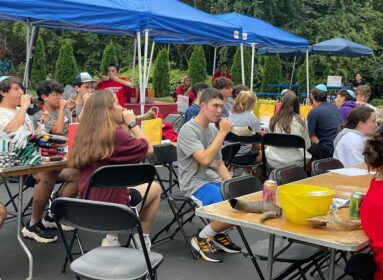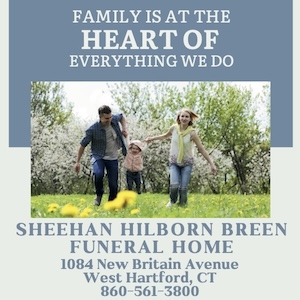
By Stacey Dresner
WEST HARTFORD – Rabbi Tuvia Brander of Young Israel of West Hartford spent the first Shabbat of this year in Petach Tikva, Israel, with Rabbi Yoni Lavi and his congregation.
In May, Lavi will come to West Hartford to spend time with Young Israel and the Greater Hartford Jewish community.
Both rabbis are a part of a new initiative of the Rabbinical Council of America, the largest membership organization of Orthodox rabbis in North America, and the Barkai Center for Practical Rabbinics and Community Development in Israel.
Brander was one of six North American rabbis to travel to Israel in early January to participate in the new initiative. The North American rabbis, along with six Israeli rabbis, spent the first part of the visit in Jerusalem participating in seminars on issues impacting the global Jewish community.
Then Brander and the group of American rabbis were paired with six Israeli rabbis, travelling to their communities and giving sermons and interacting with the members of their shuls.
One goal of this initiative is to strengthen the bonds between the American Orthodox communities and the community of Dati Leumi (National Religious) Israelis. Another goal is for the North American rabbis to train their Israeli counterparts “in all aspects of communal rabbinics so that they can lead their communities to a more meaningful connection with Judaism and act as a unifying force in Israeli society,” Barkai says on his website.
“Most Dati Leumi Israelis are not aware of the riches, sophistication and intricacies of North American Jewish communal life,” Brander says. “In fact, the model of ‘community-centered’ Judaism is just starting to take root in Israel, and North American Jews have the potential to contribute greatly to this growing positive development,” Rabbi Brander.
Brander explained that the Barkai Center, co-founded by Rabbi David Fine, a native of the U.S. and Brandeis University alum who made aliyah in 2008, “represents one of many aspirations in the Israeli community to create Israeli Jewish communities like we have here.
“In Israel, it’s a very different structure,” Brander says.
Shuls in Israel are only for prayer. Rabbis are appointed by the government, not the congregations; and they are usually not full-time, and are not trained in pastoral skills.
“The role for a synagogue community like it exists and has existed in Jewish life since the exile has really fallen away,” Brander said. “Israelis are looking to models in America and American models that have been transplanted to Israel …and recognize there is a tremendous benefit. There is a richness they are missing in their current model. And they are trying to figure out how they can – not replicate it, because you can’t just bring something that is American to Israel – but create their own [model] and see how to take the strengths of this model and model their own.”
During the seminars in Israel, the Israeli rabbis had many questions about American synagogue communities.
“It was everything from how do you work with a board? How you work with lay leaders. How you address certain issues in the community,” Brander says. “There were conversations on how you engage with different types of Jews. Israelis don’t understand what it means to be a part of a broader Jewish community and the level of respect and love we have here with the Conservative and Reform movement.”
Rabbi Brander served as scholar-in-residence at Lavi’s shul in Petach Tikva and gave the sermon at Friday night services. After the service, he stayed for Shabbat dinner and an oneg at which he answered congregants’ questions.
“People stayed for about three hours just asking questions about America, to learn more about the Jewish community here; to learn more about how we conceive of our Jewish identity,” he says. “They wanted to know how you deal with a community that has members who are more seasoned and younger members – how do you balance programming for families with younger children and families with older children? What roles do you play as a rabbi as like a convener of communal lifecycles and challenges but also, what are the boundaries? How do you develop that pastoral care?”
Lavi, Brander’s Israeli counterpart, will visit West Hartford on the weekend of May 9. He will spend Shabbat at the Young Israel of West Hartford and learn about the greater Hartford Jewish community and how it functions.
“During his visit to West Hartford, while Young Israel will be hosting him, we are looking forward to doing collaborative programs with other organizations in town,” Brander says. “We are already in the works with Aleph to do a program with them, the JCC and the Foundation as well as with New England Jewish Academy and the Jewish Federation.
“My hope is to expose him to the rich, vibrant and diverse Jewish life we are blessed to have here in the Diaspora in general and in particular in the Greater Hartford region.”
Main Photo: Rabbi Yoni Lavi, left, and Rabbi Tuvia Brander.








 Southern New England Jewish Ledger
Southern New England Jewish Ledger









